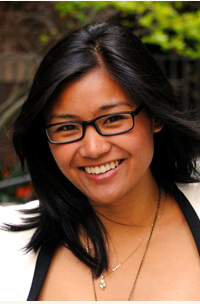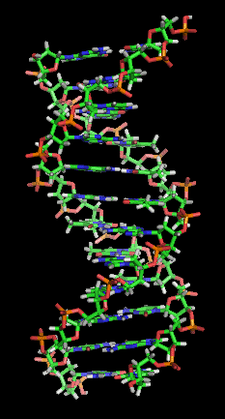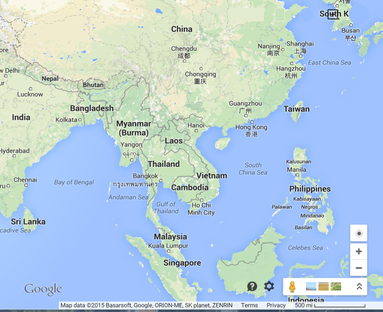 My next three guest bloggers for this year's #WomenInSTEM series join us from The University of Tennessee in Knoxville. Currently, all three of these inspirational women are graduate students in the Bredesen Center's interdisciplinary doctoral program in Energy Science and Engineering, but each started their journey on a different continent from one another, come from different scientific backgrounds, and have distinctly different plans for their futures in STEM as well. First up... Kristine Cabugao joined the Bredesen Program last fall after she graduated with her undergraduate degree in Molecular Environmental Biology from the University of California, Berkeley in the spring. Originally from a village in the Philippines, Kristine has been drawn to the sciences from a young age. Here, she describes what first sparked that interest, and how even as a student at one of the top universities in the country, she has battled fears and doubts that I'm sure are probably familiar to many of us, men and women alike, in all fields of STEM. She shares with us how she overcame adversity and the various challenges she has faced. Kristine is currently working with Dr. Neal Stewart on root-specific promoter expression for switchgrass modification in relation to biofuel development. In the upcoming year, she hopes to transition to the Climate Change Science Institute at Oak Ridge National Laboratory to study plant stress response due to climate change in terrestrial ecosystems. In her free time, she enjoys hiking, running, and landscape photography.  By the time everyone gets to high school, I’m willing to bet they’ve already heard about cells and DNA. It’s a pretty routine subject, right up there with how to add and multiply. But I doubt many have actually had the opportunity to touch DNA (it feels like snot), let alone interact with it. In my sophomore year of high school, I made E. coli cells glow by inserting a small section of DNA that contained the green fluorescent protein (GFP) gene. Looking back, it was such a simple and routine protocol but that one experiment brought everything I read about in the textbooks to life. When DNA is described in textbooks, it can be rather dull. They usually refer to it as a blueprint as though it just kind of sits there in the cell not doing much. In reality, it is so much more fluid and open to change and possibilities. I loved the idea of understanding something that connected all living things; like getting a glimpse into life’s backstage. It was around the same time that I began hearing about climate change and the role that molecular biology could play in understanding what that means for the environment. "I loved the idea of understanding something that connected all living things;  My family moved to America in 1998 from the Philippines. Back in our village, I grew up chasing chickens barefoot, bathing in rivers, and wandering (literally wandering) through the forests and rice terraces all day. It was near impossible not to wonder what climate change would mean for the people and lands that we left behind. I chose to go to college at the University of California, Berkeley because of their Molecular Environmental Biology major, which I felt would give me to the tools to answer that question. However, during my first semester of undergrad, I distinctly remember sitting beneath a tree by a creek on campus, and seriously considering withdrawing from the university. It was not because I was failing or anything, but because I honestly doubted whether I was actually supposed to be there. For as long as I could remember, I excelled academically and I studied hard to keep it that way. I was supposed to be smart and up until this point I really thought I was, but every day felt like I was going up against people who, no matter how hard I worked, would always prove me wrong. I started thinking that maybe science was "out of my league" and perhaps I should settle for a field, and a university, that was more my speed, whatever I thought that even meant. I realize now that these distressing emotions were because of my perceptions, more specifically, the belief that high grades mean high intelligence, and that the lower grades I was getting in comparison to my peers meant that I was less intelligent and less worthy of being a scientist. "I started thinking that maybe science was 'out of my league' and perhaps I should settle for a field, and a university, that was more my speed, whatever I thought that even meant." Back then, the fears and doubts were so pervasive that there was no room to feel the same certainty I have now about how science is my way of creating some kind of impact in the world. I made a deal with myself that day that all I had to do was make it through one more week and if at the end of the week I still felt like this, then I could quit. One week became two; two weeks became a month, and little by little I started rediscovering how much fun learning science could be. Over time, I started focusing on what I loved about biology and not so much on whether I was "smart enough" or "talented enough" to pursue it. In a way, I had it backwards. I thought that if I wanted to be a scientist, I had to have the highest grades, but focusing on that only made them worse. It wasn’t until I relaxed and just started learning again for the fun of it that things changed. Academics at Berkeley never became easier, but that stopped getting in the way of how I felt about my potential. I suppose there will always be people that are seemingly born to be scientists but now I know that the existence of those people does not imply that I am not capable of making my own contribution, especially if I am willing to struggle long enough to pursue its completion. "...science is my way of creating some kind of impact on the world. ...I started focusing on what I loved about biology and not so much on whether I was 'smart enough' or 'talented enough to pursue it." Have you ever felt like what you were doing just wasn't good enough? Have you ever found yourself comparing your work to your peers? What do you do to overcome those thoughts/feelings? What motivates you to pursue a STEM degree/career or stay in one?
2 Comments
Susan Steiner
3/24/2015 01:49:24 pm
This is a really wonderful one, Mallory! I love that it starts with her experience in high school. planning to share it with my students!
Reply
Leave a Reply. |
Hello!Welcome to Think Like a Postdoc. If you're a fan of science as much as I am, and/or are curious about getting a degree in a STEM field, or pursuing an interdisciplinary graduate degree (all from the perspective of a graduate student), then you're in the right place. Think Like a Postdoc also includes posts about my current lab and field research, including analytical chemistry, Arctic biogeochemistry, and energy & environmental policy. Comments and questions are always welcomed. And please tell me what you want to hear about next! Top PostsQuestions to Ask Before Choosing Grad Program
Dirt Popsicle First Semester of Grad School Field Work in Alaska Science Conference Dos and Don'ts Women in STEM Series Things I've Learned in Grad School Series Blogs I FollowMass Spectrometry Blog
Metabolon Compound Interest The Grad Student Way SouthernFriedScience Science Blogs Anthony's Science Blog The Thesis Whisperer GradHacker Fossils and Shit Science Communication Breakdown Science Communication Media Categories
All
Blog Archives
August 2017
|
 RSS Feed
RSS Feed

